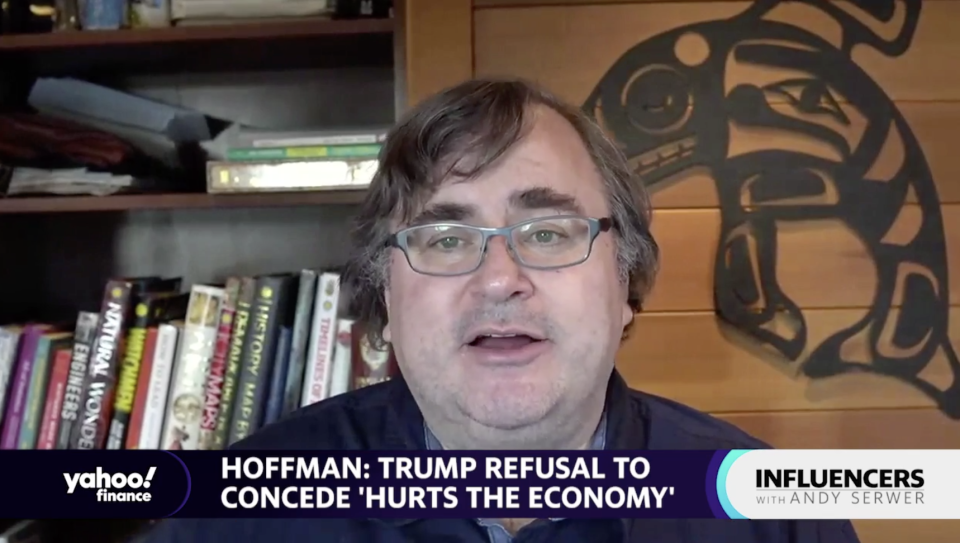Trump’s refusal to concede ‘hurts the economy’: LinkedIn co-founder Reid Hoffman
LinkedIn co-founder Reid Hoffman, a top Silicon Valley investor and Democratic donor, said on Wednesday that President Donald Trump’s refusal to concede the election “definitely hurts the economy.”
“This kind of chaos is anti-business,” he told Yahoo Finance Editor-in-Chief Andy Serwer. “Instability is bad for all business, including technology.”
Trump on Thursday continued to question the legitimacy of the election and suggest he had defeated President-elect Joe Biden, despite an absence of evidence to back up Trump’s repeated allegations of voter fraud.
The New York Times contacted election officials in every state, who said they had not seen any evidence of fraud that affected the outcome of the election.
On Saturday, the Associated Press called the election for Biden. He leads with 279 electoral votes over Trump’s 217, and holds an advantage in the popular vote of more than 5 million ballots, according to The New York Times.

The administration’s unwillingness to take customary steps toward a peaceful transfer of power comes amid the removal of several senior officials at the Defense Department, including Secretary of Defense Mark Esper, raising alarm among some at the Pentagon, CNN reported.
Hoffman, a partner at venture capital firm Greylock Partners, said the stability of U.S. democracy contributes to a business-friendly economic environment.
“People frequently associate business only with free-flowing capital, lower taxes, and lower regulation,” he says. “There are lots of things that help actually affect business, like for example, a stable society that's predictable and an environment that you can invest in.”
Fitch Ratings cautioned last month that a deviation from "well-understood rules and processes for the transfer of power" could cause the U.S. to lose its AAA rating.
‘An embarrassment’
To be sure, a concession is not necessary for the completion of the election process and states are moving forward with the certification of their results. For his part, Biden called Trump’s refusal to concede “an embarrassment,” expressing confidence that a transfer of power will take place as planned on Jan. 20.
So far, the stock market has not suffered from uncertainty surrounding the transition. As of Thursday morning, the S&P 500 (^GSPC) had risen 7.9% and the Dow (^DJI) had jumped 9.2% since Election Day on Nov. 3.
The remarks from Hoffman echo sentiment expressed to Yahoo Finance last Friday by economist Stephen Moore, a longtime ally of Trump who advised his 2016 presidential campaign.
When asked whether Trump’s refusal to concede the election could damage the U.S. economy and disturb markets, Moore replied: “Yes, that is one of the costs of holding this up.”
“We are a country that has political stability — that’s one of our many assets,” he added.
Hoffman spoke to Serwer in an episode of “Influencers with Andy Serwer,” a weekly interview series with leaders in business, politics, and entertainment.
Rebutting unfounded allegations of voter fraud, Hoffman said state election officials took the appropriate amount of time necessary to count mail-in ballots.
Many states count mail-in ballots last, even though they come in first. Plus, Democrats were more likely to vote by mail than Republicans, in part because the Democratic Party encouraged voters to use that avenue in order to avoid potential exposure to COVID-19.
“There was this kind of constant Republican line of ‘you're adding endpoints after the game is called,’” Hoffman says. “Okay, we want to use a metaphor: It's like you scored a leading touchdown in the third quarter of the game, and you want to call the game, versus waiting for the fourth quarter.”
“Doing vote by mail,” he adds. “That's not calling the game early — that's calling the game on time.”
Read more:
Coronavirus ‘dramatically accelerated’ e-commerce up to 5+ years: Kohl's CEO
Citi ‘will be prepared’ for contested 2020 election: CEO Michael Corbat
Bill Gates: We should be able to ‘manufacture a lot of vaccines’ next year
Netflix co-founder on creative culture: We ‘manage on the edge of chaos’
Read the latest financial and business news from Yahoo Finance